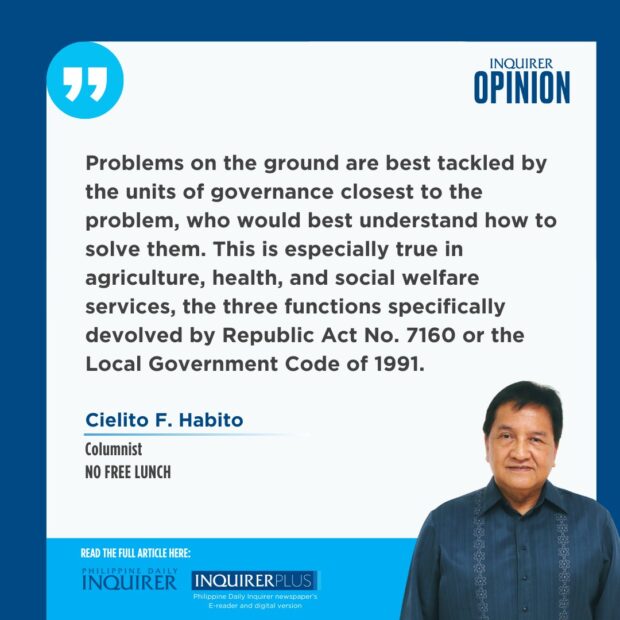Ramos’ first D

Those of us old enough during the presidency of Fidel V. Ramos in 1992-1998 would remember the five Ds with which he summed up his development strategy, namely devolution, decentralization, democratization, deregulation, and sustainable development.
He invariably mentioned devolution first, which I believe was deliberate. At the time, David Osborne and Ted Gaebler’s bestseller “Reinventing Government: How the Entrepreneurial Spirit is Transforming the Public Sector” influenced the thinking of both the Clinton administration in the United States, and the Ramos administration here at home. Aside from preaching “entrepreneurial government,” it upheld the principle of subsidiarity espoused in the Christian Democratic principles that guided Ramos’ Lakas-CMD (Christian-Muslim Democrats) party.
Subsidiarity, simply put, says that government functions must be performed at the lowest level possible. It is one of seven principles of Catholic social teaching, which elaborates: “What individuals can accomplish by their own initiative and efforts should not be taken from them by a higher authority. A greater and higher social institution must not take over the duties of subordinate organizations and deprive it of its competence.” Higher authorities are to intervene only when the lower levels find a task to be beyond them. In governance, the popular phrase to sum it up was “let the national government be limited to steering, while local governments do the rowing.”
Article continues after this advertisementAnd it makes eminent sense. Problems on the ground are best tackled by the units of governance closest to the problem, who would best understand how to solve them. This is especially true in agriculture, health, and social welfare services, the three functions specifically devolved by Republic Act No. 7160 or the Local Government Code of 1991.
Ramos inherited the implementation of the law from his predecessor President Cory Aquino. Taking it to heart, he chose not to be a dispenser of largesse from the national government with every request for help—and funds—from below. Rather, he challenged governors and mayors to “cook their bibingka” by mobilizing the needed ingredients from their stakeholders and applying a strong “fire” of people power from below. The fire at the top from the national government was in the form of policy guidance, and capacity building as required. Later in his term, local leaders no longer presented him with wish lists of assistance during his visits, but instead gave proud reports on what they had achieved for themselves.
In reality, devolution hardly happened in practice for three decades since the Local Government Code was enacted. There are three critical reasons for this. First, the Internal Revenue Allotment or IRA (now called National Tax Allotment or NTA) of local government units (LGUs) was far from enough to support the functions mandated to be devolved to them. Second, the Departments of Agriculture, Health, and Social Welfare and Development, whose functions RA 7160 devolved, persisted with centralized governance of their sectors, often working over the heads of the LGUs rather than working through them as they should have. And third, the national government agencies (NGAs), especially the above three, should have taken responsibility for building LGU capacities to take over their work and devote attention and budgets for it but did not.
Article continues after this advertisementThe Supreme Court’s 2018 Mandanas-Garcia ruling helped address the first by boosting the share of government revenues automatically allotted to local governments. But if the government is to be true to its avowed principle that NGAs are limited to steering, more of the ever-increasing department budgets could be further downloaded to the LGUs through the provincial governments (but with iron-clad transparency and accountability safeguards). This is because even their larger NTAs remain inadequate to support truly devolved governance, especially in agricultural services. The second issue results from the NGAs’ great reluctance to give up centralized procurement that comes with top-down one-size-fits-all governance; we only need to recall the fertilizer and swine scams, and the more recent Pharmally scandal to see why.
Perversely, the three departments with devolved functions now have among the most top-heavy bureaucracies, with a proliferation of undersecretaries and assistant secretaries. The third issue is best addressed by forcing the devolved departments—not just the Local Government Academy—to include LGU capacity building among their key result areas and key performance indicators on which their performance is judged, and for which a substantial part of their budgets must be devoted. They have regional arms to accomplish this. Unfortunately, Executive Order No. 138 issued to implement the Mandanas-Garcia ruling still does not mandate this.
Malacañang would do well to include this in a new devolution order that the President has announced will be forthcoming.
cielito.habito@gmail.com
















